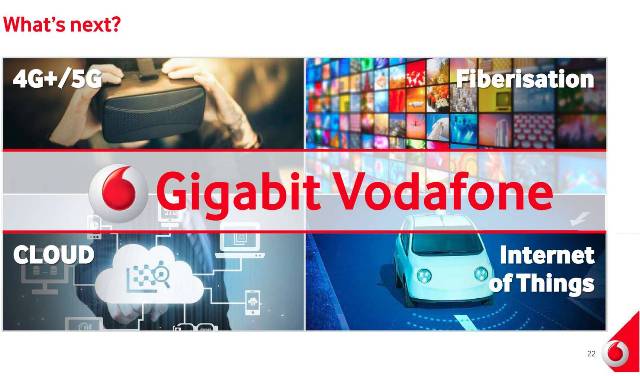 Vodafone will invest approximately €2 billion in Gigabit fibre broadband network in Germany over the next four years.
Vodafone will invest approximately €2 billion in Gigabit fibre broadband network in Germany over the next four years.
The strategy of Vodafone Germany is to offer around 13.7 million Gigabit connections for both consumers and businesses.
Vodafone said this investment will allow local enterprises and communities of all sizes to move away from slow copper-based Internet services. 25 percent of broadband connections are below 50Mbps, with only 2 percent of all broadband connections at Gigabit speeds.
The number of enterprise bids that include fibre has doubled since last year.
Financial implications for Vodafone Germany and for the Group:
# incremental success-based investment will drive an uplift of 1-2 percentage points in Vodafone Germany’s service revenue growth rate compared to our prior expectations, starting from FY 19/20
# Incremental EBITDA margins are expected to be materially higher than Vodafone Germany’s current EBITDA margin (34.1 percent in FY 16/17).
# Incremental accrued capital expenditure is expected to be approximately €2 billion in total, spread over the next four financial years (FY 18/19 to FY 21/22), with limited impact in FY 17/18.
Giga-Business initiative
Vodafone, as part of its Giga-Business initiative, announced a partnership in July 2017 with Deutsche Glasfaser, a provider of fibre-to-the-premises networks in Germany, to reach 19 of Dusseldorf’s industrial and commercial business parks by early 2018.
Vodafone now aims to reach 100,000 companies in around 2,000 business parks by the end of calendar 2021, at a cost of approximately €1.4 billion – €1.6 billion.
The partner (and in some cases Vodafone) will deploy the passive infrastructure, while Vodafone will operate the network and supply services to customers. Vodafone will typically take full ownership of the passive infrastructure. This approach is cash efficient, as it limits the up-front cash outflow to around one-third of the total build and CPE costs. The estimated unlevered IRR of this initiative is over 20 percent, with a typical payback period per individual business park of under 4 years.
Giga-Municipality initiative
Vodafone, as part of the Giga-Municipality initiative, aims to offer gigabit services to around one million consumer households in rural areas, in co-operation with local municipalities, by the end of calendar 2021.
The local municipality will build and own the passive network infrastructure from the central office to the home, with the potential support of government fibre subsidies. Build-outs will begin once around one third of the homes in a municipality have committed to buy fibre services.
Vodafone will operate this network under a long term partnership/rental agreement, building the link between the central office and its fibre backbone, deploying the active equipment (including CPEs) and paying the connection costs for each household. For Vodafone, this is expected to cost around €0.2 – €0.4 billion. The estimated unlevered IRR of this initiative is over 20 percent, with a typical payback period of under six years per municipality.
Giga-Cable initiative
Vodafone’s Giga-Cable initiative aims to enhance Vodafone’s entire cable footprint from the current top speed of 500 Mbps to 1 gigabit per second, through the accelerated adoption of DOCSIS 3.1 technology. The cable network will be enabled for DOCSIS 3.1 services over two years compared to the previous four-year rollout plan.
Gigabit speeds will start to be available in the largest German cities in 2018. This initiative will cost approximately €0.2 billion (excluding CPEs). The payback period for this initiative is less than four years, as the substantial increase in network capacity as a result of deploying DOCSIS 3.1 reduces the need for additional capacity investments.





